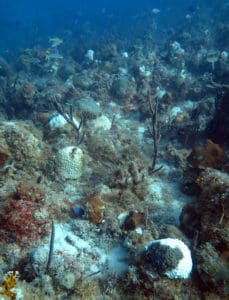
The Department of Planning and Natural Resources advises the community that the recent heat and rise in ocean temperatures around the territory and region are higher than normal, thereby leading to an increase in coral bleaching.
When temperatures rise, corals begin to stress and can turn pale or even stark white. This process is called coral bleaching. Bleached corals are vulnerable to disease and starvation. Stress and disease can cause corals to have lesions, spots or tissue loss. If the water stays warm for too long, these corals can die. If the temperature drops back down in time, the corals can often recover.
“Unfortunately, we can’t instantly turn down the thermostat on the ocean, but there are things we can do to reduce other man-made stressors to the reefs,” said Commissioner Jean-Pierre Oriol. Man-made stressors, including runoff and other sources of pollution, overfishing, overuse of reef areas and the introduction of invasive species, are all impacting corals on top of the thermal stress they are already experiencing.
The Department of Planning and Natural Resources urges the community to do its part to protect the coral reefs, particularly in this stressful time, by reducing the stressors that people can control:
Keep your distance: do not touch, stand or anchor on reefs; practice good buoyancy when scuba diving; keep space between you and the reef.
Keep pollution out of our waters: use mineral sunscreens without oxybenzone; clean up debris that can make its way into the coastal environment; prevent dirt and silt from washing into the ocean by having sediment and erosion control devices properly installed on construction sites.
Let fish help the corals: reef fish eat algae that can overgrow our corals, so avoid fishing for parrotfish, surgeonfish and other plant eating fishes.
Report what you see: When swimming, diving or snorkeling take note of how the corals look; contact the appropriate agencies with an update on the reefs near you (pictures are the most helpful).
To learn more about what can be done to reduce one’s impact on the coral reef, contact Kitty Edwards, CZM education and outreach coordinator, at 774-3320 or email at Kristina.edwards@dpnr.vi.gov
For information on the BleachWatch program and how to receive trainings and updates, contact Lisa Terry of The Nature Conservancy at lisa.terry@tnc.org or visit www.reefconnect.org/bleachwatch or download the BleachWatch VI app.





